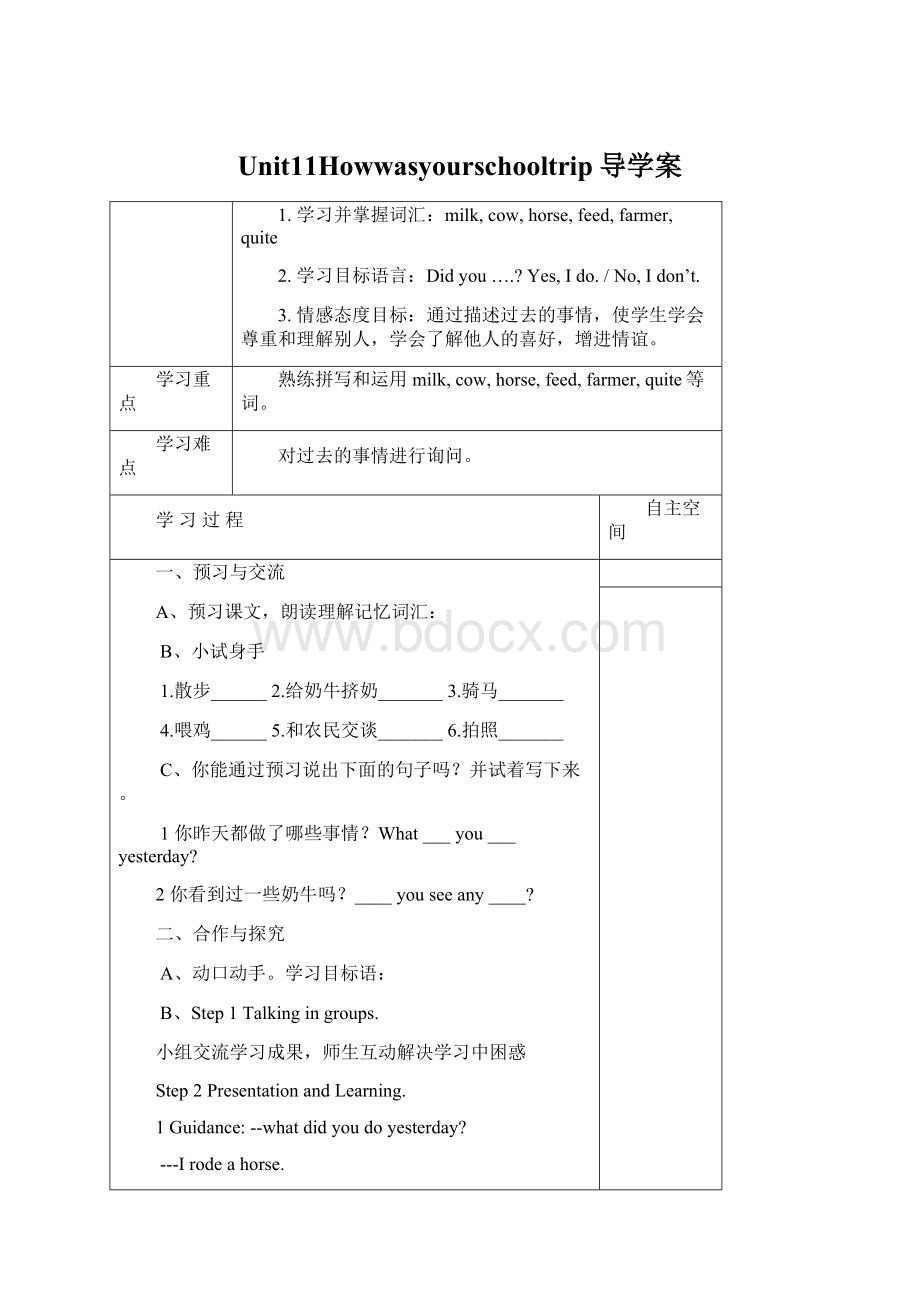Unit11Howwasyourschooltrip导学案Word下载.docx
《Unit11Howwasyourschooltrip导学案Word下载.docx》由会员分享,可在线阅读,更多相关《Unit11Howwasyourschooltrip导学案Word下载.docx(16页珍藏版)》请在冰豆网上搜索。

小组交流学习成果,师生互动解决学习中困惑
Step2PresentationandLearning.
1Guidance:
--whatdidyoudoyesterday?
---Irodeahorse.
2.Pairwork:
Didthegirlseeanycows?
Yes,shedid./No,shedoesn'
t.
Step3Languageabilitypractice
1fininsh1a
2finishthelisteningtaskin1b,2b,2c.
c、小组展示
三、展示交流
挑战一:
观察与运用。
先组内讨论交流,然后由小组派代表就共性问题进行讲解。
针对学生的疑惑,教师给予点拨。
挑战二:
机会就掌握在你手中,快将改编的对话在全班面前展示吧。
挑战三:
…相信你一定行!
Comeon!
四、点拨升华
A、一般过去时表示过去某个时间里发生的动作或存在的状态。
一般过去时的一般疑问句基本结构:
Did主语+动词原形+其他?
例:
---Didyouseeanycow?
---Yes,Idid./No,Ididn’t.
B、milk的用法:
milk即可作动词,也可作名词。
作名词时,意为“牛奶”;
作行为动词时,意为“挤奶”。
试译:
给奶牛挤奶_____
五、当堂练习.
I.单项选择。
()1.Didhe___tosleeplatelastnight?
A.wentB.goC.goes
()2.YesterdayIdidn’tstayathome.I___tomyteacheratschool.
A.talkB.talksC.talked
()3.We___anyclasseslastweek.
A.don’thaveB.didn’thaveC.had
()4.China___theWTOin2001.
A.joinedB.joinsC.join
()5.—DidyouwatchTVlastweek?
—_____.
A.Yes,IdoB.Yes,IdidC.No,Iwasn’t
Ⅱ.用括号内所给单词的适当形式填空。
1.TomandMary_____(come)toChinalastmonth.
2.Mymother_____(notdo)houseworkyesterday.
3._____yourfather_____(go)toworkeverydaylastyear?
4.He_____(be)herejustnow.
5.Didshe_____(have)supperathome?
Ⅲ.根据汉语完成句子。
1.我三年前骑过马。
I____a____threeyearsago.
2.昨天我们在公园照了相。
We________intheparkyesterday.
3.昨天上午他们回家喂了小鸡。
They____homeand____thechickensyesterdaymorning.
4.一些工人刚给奶牛挤了奶。
Someworksjust____the____.
5.上周他与村里的农民谈了话。
He____withthe____inthevillagelastweek.
六、课堂小结
1、我的收获:
2、我的困惑:
课题
七下Unit11Howwasyourschooltrip?
(第二课时2d-3b)
课型
新课
备课
学习
目标
1.学习并掌握词汇:
anything,grow,farm,farming,pick,excellent,countryside,clean,yesterday,flower,worry,luckily,sun
2.学习目标语言:
WhatdidCaroldo?
Shepickedsomestrawberries.
3.情感态度目标:
通过询问同学间过去所做的事情,增进同学间的感情。
熟练拼写和运用等词。
优秀的_____摘草莓_____爬山_____在乡下______
comeout_____gofishing_____luckily_____
1你上个星期的旅行怎么样?
How_____your_____lastweek?
任务一、分角色朗读2d.
任务二、读GrammarFocus,并注意过去时的用法。
任务三、根据所给的动词变化完成3a.
任务四、根据3b小组内编一个小故事。
1、代词anything的用法:
anything是不定代词,意为“任何事情;
任何东西”,常用于否定句及疑问句中,与something同义,但something常用于肯定句中。
用something,anything填空。
(1)There’_____wrongwithyoureyes.
(2)Isthere_____importantintoday’snewspaper?
2、worry的用法:
worry是行为动词时,意为“担心;
着急;
焦虑”,常与介词about连用,意为“对……感到担心”,其形容词为worried(担心的,焦急的),过去式为worried。
用worry的正确形式填空。
(1)Tom,don’t____aboutyourperdog.
(2)I____aboutmylittledaughterverymuchlastnight.
五、当堂练习
I.单项选择。
()1.Mybrotherdidn’tcomebacklastnight.I___abouthimeverymuch.
A.worriedB.worryC.wasworrying
()2.Mostgirlslike____verymuch.SomanyboysbuythemonValentine’sDay(情人节)。
A.fishB.flowersC.clothes
()3.Heshowedus____thelargefactory.
A.toB.inC.around
()4.They‘re____sometreesonthesidesoftheroad.
A.growingB.pickingC.getting
()5.Feedingthechickensisso____fun.
A.manyB.muchC.alittle
Ⅱ.用所给词的正确形式填空。
see,fish,any,luck,farm
1)Molly’sfatherisa_____intheUK.
2)Lastyearmyfather_____aUFOinmyhometown.
3)_____,hesavedthelittleboyatlast.
4)I’mgoing_____thisafternoon.
5)Shelookedaround,butshedidn’tfind_____.
Ⅲ.根据汉语意思完成句子。
1.昨天他在乡下摘草莓了。
_____he___thestrawberriesinthe____.
2.Eric在农场没有找到任何有用的东西。
Ericdidn’tfind_____useful_______________.
3.请不要担心他。
Pleasedon’t__________him.
4.今天早上,我们担心天要刮风。
幸运的是,没有起风。
Thismorningwe_____it_____blow.______,itdidn’t.
5.那是去乡下的一次极好的旅行。
Itwasan_____journeyinthe______.
2、我的困惑:
(第三课时1a-1d)
museum,fire,painting
Iwentto…Thatsounds…
通过同学间的旅游经历交流,增加阅历让同学们更热爱生活。
熟练拼写museum,fire,painting等词和运用基本句型Iwentto…Thatsounds…
掌握一般过去时并在实际情景中自如运用。
参观博物馆________消防站________
visitamuseum________drawpictures_______
你的旅行怎么样?
How______yourtrip?
任务一、利用投影仪将书中的图片展示出来,将1a中的词组和图片对号。
任务二、播放两次录音完成1b1c。
任务三、和同学讨论学校的旅行,对练习进行讨论并进行角色表演
A、动词的过去式变化规则:
1.直接加ed:
work—worked,look—looked,play--played
2.以不发音的e结尾的单词,直接加d:
live—lived,hope--hoped
3.以辅音字母+y结尾的单词,变y为i加ed:
study—studied,carry—carried,worry--worried
4.以元音字母+y结尾的,直接加ed:
enjoy—enjoyed,play--played
5.以重读闭音节结尾的,双写最后的辅音字母+ed:
stop—stopped,plan--planned
不规则变化的动词过去式:
have—had,are—were,get—got,say—said,feel—felt,do/does—did,is--was
I.单项选择。
( )1.____theweatheryesterday?
A.How’sB.HowwasC.Whatwas
()2.____he____TVeveryday?
A.Did;
watchedB.Does;
watchC.Does;
watched
()3.____isfree(免费的)here.Wealllikeplayinghere.
A.SomethingB.AnythingC.Everything
()4.Ilike____trainbecauseIcanwatchthescenesmoreeasilyalongtheroad.
A.slowB.fastC.tall
()5.—_____
—Itwasexcitingandinteresting.
A.How’sitsgoing?
B.Didyouhaveagoodtrip?
C.Howwasyourschooltrip?
Ⅱ.根据句意及首字母提示填空。
1.LastSunday,twoforeignersvisitedtheartm_____.
2.Thiscomputeristooe_____.Idon’twanttobuyit.
3.It’sveryd_____now.Couldyouturnonthelight(灯)?
4.Ilikethemodelr_____verymuch.
5.Af_____destroyed(被毁)everythinginthevillage.Ⅲ.用所给词的适当形式填空。
1.Ioftenhearhim____(sing)inclass.
2.Hearingthe____(excite)new,Iwentoutfast.
3.Doyoulikethe____(love)child?
4.Larryisn’t____(interest)inthestory.
5.Theguidetaughtushow____(make)modelpandas.
Ⅳ根据汉语意思完成句子。
1.Thestudents_____the_____(参观博物馆)yesterdaymorning.
2.Myparentsworkata__________(消防站)。
3.Iboughtsome__________(可爱的礼物)formychildatashop.
4.Isthissweater_______________(便宜还是贵)?
5.I’m__________(感兴趣)thisTVshow.
(第四课时2a-2c)
exciting,lovely,expensive,cheap,slow,fast,robot,guide,gift,everything,interested,dark,hear
学会对自己的旅行进行描述.
交流旅行心得,了解他人。
运用过去时描写自己的旅行.
学写日记这一文体。
对…感兴趣________了解_______参加学校旅行_______
allinall_______giftshop______takephotos_______
总而言之,这是令人兴奋的一天。
All__________,itwasan______day.
A、区分2a中的贬义词和褒义词。
B、阅读2b,找出问题的答案。
C、阅读2b,完成2c中的表格。
D、同学们各自描述自己的旅行,并通过日记的形式把它记录下来。
A、形容词exciting的用法:
exciting为形容词,意为“令人兴奋,激动的”。
它常用来形容“某是令人兴奋、激动”,其主语是物而不是人。
在用英语中,以-ing结尾的形容词表示“令人……的”,用来形容物,而以-ed结尾的形容词则表示“某人……的”,用来形容人。
用括号内单词的正确形式填空。
(1)Childrenarealways____in____(interest)stories.
(2)Mr.Zhangisvery____whenheheardthe____(excite)news.
B、expensive:
expensive意为“昂贵的”,反义词是cheap,意为“便宜的,廉价的”。
expensive和dear的异同:
两者均可表示“贵”,但前者多指物美价高,非购买者财力所能及:
而后者多指物价超过常情。
试译:
她的衣服很贵,但他的衣服很便宜。
Herclothesare______buthisis____________.
C、动词hear的用法:
hear是行为动词,意为“听到,听说”,表示“听到”的结果,后跟名词或代词,过去式为heard.常用短语有hearsb.dosth.(听到某人做某事),hearsb.doingsth.(听到某人正在做某事),hearof(听说),hearfrom(收到某人的来信)等。
它与listen同义。
但listen注重的仅仅是动作,而不是结果,后跟“听”的对象时,需加介词to.
用hear或listen及其短语填空。
(1)DoesLucyoften_______hersing?
(2)______tome!
Don’tlookoutofthewindow.
(3)______!
Canyou_______anythingnearhere?
(4)I______fromHelenyesterday.She______ofIhadagoodEnglishteacher.
Ⅰ.单项选择。
()1.Wegot______whenweheardthe______news.
A.excited;
excitingB.excited;
excitedC.exciting;
excited()2.Jimisavery_____personandweare______inhisstory.
A.interested;
interestingB.interesting;
interested
C.interested;
()3.He______oneof______friendsatthestationyesterdayafternoon.
A.saw;
himB.saw;
hisC.sees;
his
()4.—Howwasyourschooltrip?
—Prettygood!
We______thehistorymuseum.
A.visitB.visitedC.willvisit
()5.Pardon?
I______hearyou.
A.don’tB.didn’tC.can’t
Ⅱ.用所给单词的适当形式填空。
1.He______(be)atworkyesterdaymorning.
2.Wheredidyou______(spend)yourholiday?
3.Tom______(do)someshoppingwithhismotherlastSaturday.
4.Mymotheroftendoessome______(cook)athome.
5.Ididn’twatchTVlastnight,I______(see)moviewithmyfriend.
1.昨天那些学生参观了一个消防站。
Yesterdaythosestudents______a____________.
2.孩子们对博物馆里的机器人很感兴趣。
Childrenwere____________the______atthe______.
3.向导教了我们如何变得兴奋起来。
Theguide______us____________be______.
4.总而言之,这是令人兴奋的一天。
_____________________,it’san_______day.
5.Tom上周的旅行怎么样?
____________Tom’s______lastweek?
(第五课时3a-selfcheck)
visitthezoos,takesomephotos,gotothecountryside
Howwasthetrip?
Itwas…
通过对旅行的回忆来更加热爱生活。
重点单词以及词组的掌握
一、